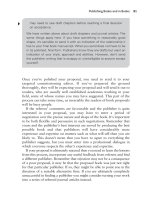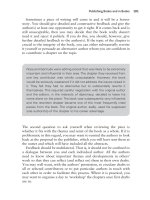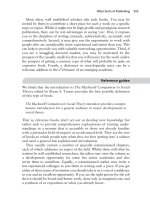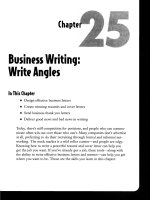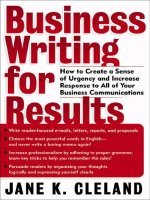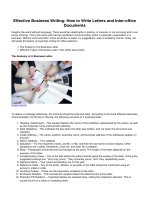Effective business writing for tax EY
Bạn đang xem bản rút gọn của tài liệu. Xem và tải ngay bản đầy đủ của tài liệu tại đây (432.8 KB, 97 trang )
Effective business writing for Tax
T
Contents
I: Introduction ............................................................................................... 3
1. Why is written communication at Ernst & Young so important? ...................................4
2. Why am I on this course? ............................................................................................5
3. Course aims ...............................................................................................................6
4. Structuring letters......................................................................................................7
II: The writing process.................................................................................... 9
1. The main steps ....................................................................................................... 10
III: Grammar review ..................................................................................... 19
1. Present perfect simple vs. past simple ..................................................................... 20
2. Direct and reported speech...................................................................................... 22
3. Word order .............................................................................................................. 25
4. Recommend and suggest ......................................................................................... 27
IV: Production ............................................................................................. 30
1. Introductions .......................................................................................................... 31
2. Firming the conclusion ............................................................................................ 34
V: Use of language ....................................................................................... 36
1. Plain English............................................................................................................ 39
2. The four Cs.............................................................................................................. 40
3. Six specific techniques to improve your writing style................................................ 40
4. George Orwell’s Golden Rules .................................................................................. 49
5. Principles of good writing - LISTEN, LOOK, TOUCH .................................................. 50
1
VI: Cohesion ................................................................................................ 51
1. Introduction ............................................................................................................ 52
2. The basics of punctuation ........................................................................................ 53
3. Conjunctions ........................................................................................................... 54
4. Logical connectors .................................................................................................. 56
5. Run-on sentences.................................................................................................... 60
6. A few more tips ....................................................................................................... 62
VII: Articles................................................................................................. 63
1. Introduction ............................................................................................................ 64
2. The noun approach .................................................................................................. 65
3. Proper nouns - useful rules ...................................................................................... 66
4. Articles with countable and uncountable nouns ........................................................ 70
5. Common errors........................................................................................................ 73
6. Articles test ............................................................................................................ 74
VIII: Common mistakes ................................................................................ 75
1. Common vocabulary problems ................................................................................. 76
2. Rise / raise / arise ................................................................................................... 79
3. Describing time spans and limitations: until / by....................................................... 81
4. Risk and exist .......................................................................................................... 83
5. Funny adjectives...................................................................................................... 84
IX: Grammar reference................................................................................. 85
1. Past perfect ............................................................................................................ 86
2. Conditionals ............................................................................................................ 87
3. Gerund versus infinitive ........................................................................................... 89
4. Defining and non-defining relative clauses................................................................ 92
5. How important are commas? ................................................................................... 93
6. Indirect questions.................................................................................................... 94
2
I: Introduction
3
1. Why is written communication at Ernst & Young so important?
What forms of written communication might EY people produce?
Why might we produce this material?
4
2. Why am I on this course?
My writing skills are already very strong. So why am I here?
We spend time developing writing skills because:
·
·
·
·
so much of our output is in writing
people rely on our advice to make important decisions
our letters are visible and permanent
clients pay a lot of money for them.
Even native speakers of English receive courses at EY to improve their written English.
Indeed, some of the material here is based on a course given to people in the London
office.
Good writing skills are crucial.
They can always be improved.
People with good English writing skills spend less time rewriting documents and,
therefore, leave the office earlier. J
5
3. Course aims
This course will not teach you to write.
What it will do is provide you with advice and techniques to improve the writing skills you
already have.
We will focus on the following areas:
1. Structuring letters
2. The cohesion of letters
3. Relevancy of information
4. Conciseness
5. Style
6. Reducing errors in certain areas
7. Eliminating errors in certain areas
6
4. Structuring letters
Quickly review the letter below.
Task 1: What is the purpose of the letter?
Task 2: What is the basic structure of the letter?
Dear Mr. Jones,
Taxation of interest free loans
Referring to your telephone conversation of 21 January 2002 with Peter Chrenko, we are
pleased to provide you with our comments on the draft of the Loan Contract concluded
between ABC CR s.r.o. (“ABC”) and its parent company, American ABC (“American
ABC”).
Background
We were provided with a copy of the draft of the Loan Contract agreed between ABC and
American ABC. We understand that the Loan Contract stipulates the conditions under
which American ABC provided a loan of USD 3,000,000 to its Czech subsidiary.
The question arises of whether the contract meets the conditions outlined in our letter
dated 12 January 1999. If those conditions are met, then the loan may be treated as a
form of equity contribution for the purposes of Czech gift tax. The interest free loan
would, therefore, not be subject to gift tax on the interest saved.
Legal analysis
As outlined in our previous correspondence, there might be an exemption to the rule that
the provision of an interest free loan to a Czech subsidiary represents a proprietary
benefit which bears gift tax exposure in the Czech Republic.
Section 658 of the Czech Civil Code allows contractual parties to agree on no interest on
cash borrowings. According to a recent opinion of the Ministry of Finance, loans provided
directly from the parent to its subsidiary should be viewed as equity contributions. Such
loans do not reduce the value of the equity of the subsidiary and thus make the value of
the parent company's investment in its subsidiary more valuable. Therefore, an interest
free loan provided from a parent company to its subsidiary may be considered as having
been made for consideration and should not carry any gift tax exposure.
7
The Loan Contract review
We have reviewed the draft of the Loan Contract which you provided. The wording of the
draft has all of the conditions necessary to meet the criteria outlined above for the loan
to be treated as an equity contribution for the purpose of Czech gift tax. We believe that
if the original of the Loan Contract has the same wording, the provision of the loan would
bear only limited exposure for gift tax.
Please note that this opinion is based on the current interpretation of the Ministry of
Finance, which is not legally binding. There were cases in the past when the Financial
Authorities raised assessments for gift tax in similar circumstances. However, a loan
agreement drawn up under Section 658 of the Civil Code should be sufficient support for
arguing against any attempt by the Financial Authorities to seek gift tax on the interest
saved. Should the Financial Authorities assess gift tax for ABC in this respect, the
Ministry of Finance is entitled to waive the tax and penalty assessed.
Conclusion
The existing wording of the Loan Contract provided to us should be, in our view, sufficient
to minimise the exposure of gift tax for ABC on the interest saved.
Nevertheless, there is still a minor risk that the Financial Authorities might issue an
assessment for gift tax on the interest saved if they have a different opinion than that of
the Ministry of Finance. To avoid this, we would recommend that this debt be capitalised
into registered equity as soon as possible. Please note that this should happen in the
form of a decision of the General Meeting on the increase of registered equity in-kind.
If you have any questions regarding the above, please do not hesitate to contact us.
Yours sincerely,
8
II: The writing process
9
1. The main steps
Good writing takes time (and lots of practice). It pays to follow these steps:
A. Plan
B. Outline
C. Write
D. Edit
E. Review (proofread)
Treating each step as a separate phase will improve the quality of your work.
10
A. Plan
Always ask yourself the two key questions:
1.
2.
The answers to these two questions will form the basis of your plan, a profile of the
following:
·
Target reader
·
Reason for writing
·
Language to be used: requesting, complaining, informing, recommending,
proposing, etc.
·
Format: letter, e-mail, report, etc.
·
Layout: formal letter conventions, paragraphs, titles, etc.
·
Register: the style of language used. For example, when would you use the
following?
- promotional
- dry and factual
- friendly and informal
- formal
- very technical or avoiding all unnecessary technicality
- using EY jargon or not
- complex and detailed or as simple as possible.
Take time, however briefly, to think about these issues before you write.
11
Planning role play
You are going to write on the same topic to two different target readers: a client and a
colleague you know.
What difference does the identity of the reader make?
Target
reader:
Client
EY colleague of 5 years
Format:
Register:
Language
used or not
used (with
specific
examples):
12
B. Outline
Decide what you are going to write and how your message will be organized
An outline BRIEFLY summarizes the
·
content
·
organisation
and
of your written communication.
The organisation should be logical and appropriate for the content.
Discussion questions:
1. Do you always write an outline before writing?
2. Why write an outline?
Practice
A partner has asked you for a memo giving your opinion about the training for new audit
staff members in Amsterdam. Isn't the training just a two-week drinks’ party? Is it really
of value? Should the firm send new staff to Amsterdam for training?
Task: Write an outline of your memo.
Use this method:
List
Categorise
Arrange
Filling-in-the-form method
Instead of starting an outline from scratch you could fill in a standard form such as the
one on the next page. When you have filled it in you will have the beginning of an outline.
Then you can proceed to the document itself or continue to fill in more details.
13
Outline Form
1. Heading
__________________________________________________________________________________
2. Introduction
Reference to previous contact: With reference to your e-mail of …
Statement of what will be in the letter:…we are pleased to provide you with comments on the tax
treatment of …
__________________________________________________________________________________
3. Background
Our understanding:________________________________________________________________
__________________________________________________________________________
Basis of the analysis below (What you asked us to do, i.e. purpose of the letter):
The question arises as to whether the ………(possibly repeat client’s request)…..
4. Structured analysis
Points that will persuade or inform your reader:
Point a
________________________________________________________________________
________________________________________________________________________
Point b
________________________________________________________________________
________________________________________________________________________
Point c
________________________________________________________________________
________________________________________________________________________
__________________________________________________________________________________
5. Conclusion
Recommendations:__________________________________________________________
Future actions:______________________________________________________________
Maintain the relationship: We look forward to………. Should you have any further questions…..
14
C. Write
Completely express your message in writing.
In this step, you actually write the document. Completely express your thoughts in
writing in an organized way according to your outline.
D. Edit
Edit for only:
·
content
·
organization.
This step may consist of two, three or four steps, depending on how long and complex
your communication is. If it is a fifty-page document, you may need to edit your draft a
number of times. You may want to involve several other people who will read and
comment on it for you. Your goal is to get the content and organization right.
Check list
·
Is your message complete?
·
Is your message clearly stated?
·
Is it clearly organized?
·
Will your reader be able to understand what you wrote?
·
Are any changes necessary? If so, make those necessary changes now.
15
Editing a letter
Task: Read this letter and then follow the instructions on the following page.
Dear Mr Toffee,
With regard to your letter of 6 June 2007, we are pleased to provide you with our comments on
VAT in respect of advertising services provided by a Czech advertising agency to ABC.
Situation
ABC hired a Czech advertising agency based in Prague (“the agency”) to perform advertising
services (TV commercials or billboard advertising) in France. The payments for these services
were made directly in the Czech Republic (“the CR”) until the summer of this year. The amounts
invoiced by the agency were recently discovered to include VAT.
VAT treatment
According to the Czech VAT Act, only the taxable supply provided in the territory of the CR is
subject to Czech VAT. When considering advertising services, the place of taxable supply is
deemed to be the place where the services are actually performed.
In this particular situation, the place of taxable supply in respect of the advertising services is
France. Therefore, the performance of advertising services by the agency for ABC in France is not
subject to Czech VAT. Therefore, the agency should not charge any VAT to your company for
these services.
Recommendation
As mentioned above, the agency is not entitled to charge any VAT on the advertising services
provided to ABC in France. Hence, ABC is not obliged to pay this VAT. Therefore, we would
recommend claiming back the amount of VAT already paid from the agency.
The ultimate cost of VAT will not be borne by the agency as it can file a supplementary VAT tax
return in respect of its lower tax liability and the VAT overpayment will be refunded by the Czech
Financial Authorities. As a result, the VAT paid will not represent a cost to either ABC or the
agency.
The Czech VAT Act stipulates that a taxpayer (i.e. the agency) cannot claim back VAT incorrectly
charged at a higher rate (i.e. the overpayment). However, this provision cannot be applied to
your case as it only relates to taxable supplies which are subject to VAT. As mentioned above, the
performance of advertising services outside the CR is not subject to Czech VAT.
Conclusion
Advertising services provided by a Czech advertising agency outside the territory of the CR are
not subject to Czech VAT. The agency should not charge any VAT for its services provided to ABC.
If the agency charged VAT, we believe that ABC should claim back the amount concerned.
<Disclaimer>
We trust that the above is suitable for your current purposes. Should you have any questions or
comments, or if we can be of further assistance, please do not hesitate to contact us.
Yours sincerely,
16
Task 1: What is the basic structure of the letter?
Task 2: What is missing from the letter?
Task 3: Where would you insert the missing section?
Task 4: Write the appropriate section below:
17
E. Review (proofread)
At this point, you should no longer think about what you wrote (content), how you wrote
it (language) or the organization. These aspects of the document should be completed
in the editing phase.
The proofreading phase is ONLY for:
·
spelling
·
format
·
grammar
·
punctuation.
All of the details of the document are as they should be. There are NO mistakes. Good
business writing should be perfect and free of errors. Use a dictionary if you are not sure
how to spell words. Although they can be helpful, do not rely on Microsoft Word
grammar check and spell check.
Typing errors – beware!
Form
From
Risk
Rusk
Below
Bellow
Your
You
Withhold
Withheld
Send
Sent
Slow moving
Slow mowing
Fro
For
Can you think of any more?
18
III: Grammar review
19
1. Present perfect simple vs. past simple
·
Why is the present perfect used in each sentence?
·
Could we use the continuous?
·
If so, is there a change in meaning?
1.
He has lived in the Czech Republic for ten years.
2.
I have just finished the report.
3.
I have been to America twice.
20
Task: Correct the typical mistakes made in these sentences.
1. Two years ago we have advised him to use the aggressive tax approach.
2. During 2002 the company has signed a contract with a Russian customer to sell the
production line producing nuclear fuel containers.
3. (Talking to your ex-pat colleague who lives in Frankfurt) How long are you in
Germany?
4. (Written in the covering letter with an invoice) Although the project was very
complicated and time consuming, we decided to provide you with a discount of over
40 per cent from our customary fees.
5. Based on our inquiries with the Commercial Register, the following changes were
entered since the day of incorporation:
6. The Founding Agreement has been executed last week.
21
2. Direct and reported speech
Task: Complete the table below, assuming that all of the indirect speech takes place the
next day.
Direct speech
Reported speech
a) John: “You look nice.”
b) Jane: “I’m learning French.”
c) He: “I’ve forgotten to do it.”
d) The receptionist: “The client phoned.”
e) You (the student): “I can’t swim.”
f) The teacher: “I could swim when I was younger.”
Rules
·
The rules above are valid when the reporting verb (said, explained, claimed) is in
a past tense.
·
Both the original and reported speech can be used if the situation is still true. A
native speaker would generally prefer the reported version:
I didn’t know that John was married.
22
(John is still married)
Reported speech exercise
The following statements were made during an interview with PWC employees during a
working papers review. The next week, our employee rewrote the statements. Fill in the
missing verbs in the “reported speech” sentences.
1. Direct speech:
“The internal controls of the Company within the payables cycle are properly designed
and operating effectively and there are no material risks in this area of the Company’s
balance sheet.”
Reported speech:
PWC concluded that the internal controls of the Company within the payables cycle
_________________ properly
designed and operating effectively
and that there
_________________ no material risks in this area of the Company’s balance sheet.
2. Direct speech:
“We performed sufficient procedures noting no material issues.”
Reported speech:
PWC assured us that they __________________ sufficient procedures noting no material
issues.
3. Direct speech:
“Did you perform sufficient procedures to ensure that all subsequent events were
properly disclosed and accounted for in the accompanying financial statements as at 31
December 2006?”
Reported speech:
We asked PWC if they ___________________ sufficient procedures to ensure that all
subsequent events ___________________ properly disclosed and accounted for in the
accompanying financial statements as at 31 December 2006.
23
4. Direct speech:
“We performed our audit during the first few months of 2006, which gave us sufficient
confidence about any material subsequent events that might have occurred after the
year-end.”
Reported speech:
They explained to us that they ______________________ their audit during the first months
of 2006, which ______________________ them sufficient confidence about any material
subsequent events that might __________________after the year-end.
24

